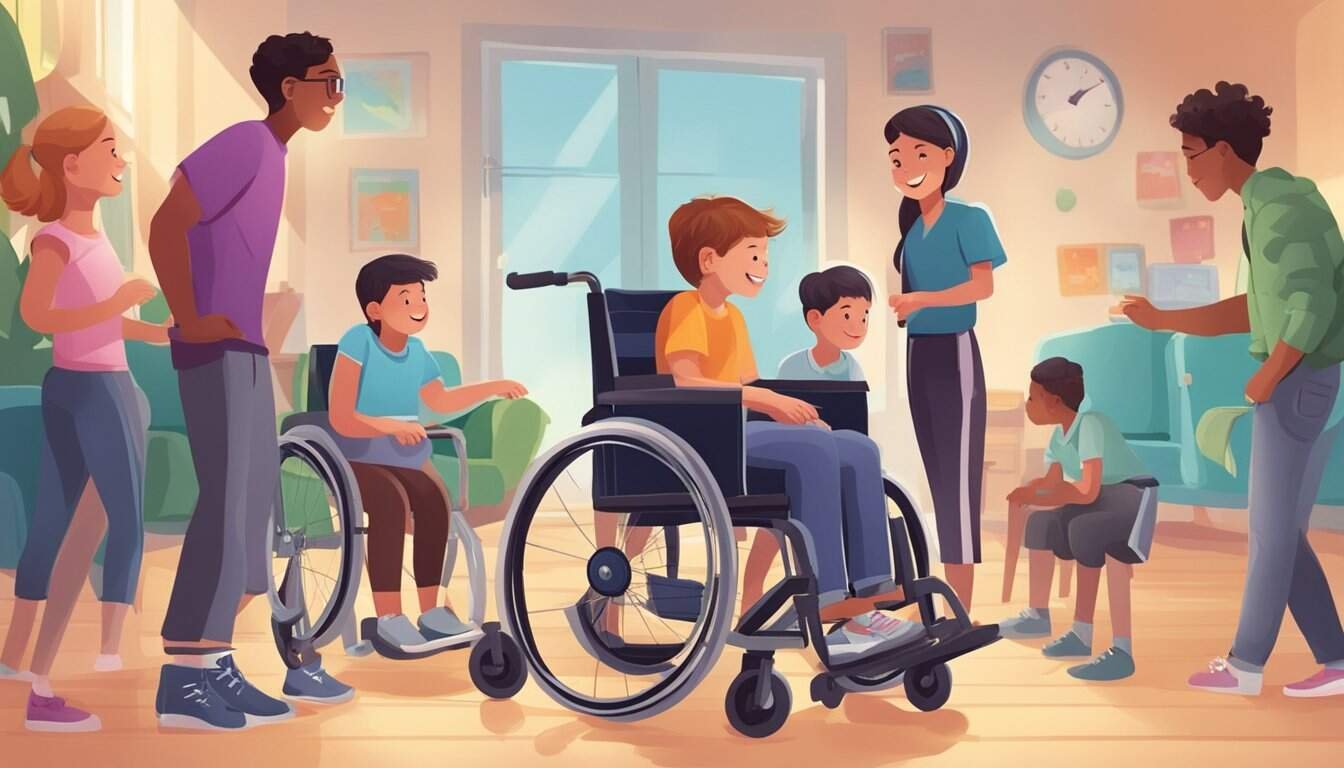Describing a special needs child can seem complex, but it essentially involves understanding the various categories of needs they may have. These categories include physical, developmental, behavioral, and sensory impairments. A special needs child is someone who requires extra support due to physical, developmental, behavioral, or sensory challenges. This can include conditions like muscular dystrophy, autism, or chronic asthma.
Children with special needs may display symptoms such as difficulties in making friends and engaging in conversation, repetitive actions, or a strong focus on specific objects or topics. These behaviors can signal underlying issues that require additional care and understanding. Parents and educators play crucial roles in recognizing these signs early to provide the necessary support.
Supporting a child with special needs involves various strategies, including tailored educational programs, health management plans, and community resources. These resources are crucial for helping these children thrive. By addressing their unique challenges, you not only improve their quality of life but also foster an inclusive environment where they can succeed.
Key Takeaways
- Special needs children require extra help due to various challenges.
- Recognizing early signs is vital for providing proper support.
- Resources and targeted education are essential for their development.
Understanding Special Needs
Special needs encompass a variety of disabilities, including physical, developmental, behavioral, and sensory impairments. It’s important to recognize early signs and understand how definitions have evolved over time to better support each child’s unique requirements.
Types of Disabilities
Special needs can be categorized into four main types: physical, developmental, behavioral/emotional, and sensory. Physical disabilities may include conditions like muscular dystrophy, epilepsy, and diabetes. Developmental disabilities include autism and down syndrome, which affect cognitive and social abilities.
Behavioral and emotional disabilities might include ADHD and mood disorders. Sensory disabilities involve impairments like blindness or deafness. Each of these types requires different approaches to care and education to ensure the child can thrive.
Early Signs and Diagnosis
Early detection of special needs is crucial. Symptoms can vary widely but may manifest as developmental delays, such as not hitting milestones like walking or talking. Behavioral signs could include frequent tantrums or difficulties in social interaction.
A thorough diagnosis often involves a combination of medical exams, psychological assessments, and educational evaluations. Recognizing early signs enables parents and educators to implement appropriate interventions and support systems, making a significant difference in the child’s development.
Evolving Definition of Special Needs
The definition of special needs has expanded over the years. Initially, it focused primarily on physical and cognitive disabilities. Today, it also includes mental health issues, learning disorders, and sensory impairments.
This evolution reflects a broader understanding of the diverse challenges that children may face. A more inclusive definition ensures that all children get the support and accommodations they need to succeed in various aspects of life, from education to social interactions.
Challenges and Support Systems

Children with special needs face a range of challenges, but there are numerous support systems available to help them thrive. These include family dynamics, educational accommodations, emotional and social considerations, and navigating health and therapy services.
Family Dynamics and Support
Families with special needs children often face unique challenges. These can include increased emotional and financial strain. You may need to spend more time providing care and support. This can affect relationships and lead to stress within the family.
Seeking support is crucial.
- Professional counseling can help manage emotional stress.
- Support groups offer a community of people who understand your experiences.
Being well-informed about available resources can also ease the burden. Psych Central discusses how severe special needs can impact family time, energy, and finances.
Educational Accommodations
Providing appropriate educational accommodations for children with special needs is essential. These can include individualized education programs (IEPs) and 504 plans. These programs ensure that your child receives the necessary resources to succeed in school.
Types of accommodations:
- Adaptive technology to help with learning.
- Extra time on tests.
- Modified assignments tailored to your child’s needs.
Using a multi-tiered system of supports (MTSS) ensures a comprehensive approach to educational success.
Emotional and Social Considerations
Emotionally, children with special needs may experience feelings of frustration, sadness, or anxiety. Socially, they might find it challenging to make friends or fit in. It’s important to address these issues to ensure their well-being.
Steps to help:
- Encourage open communication about their feelings.
- Seek professional mental health support when needed.
- Foster inclusion in social activities.
The Child Mind Institute highlights how important it is to be aware of signs that your child may be struggling emotionally.
Navigating Health and Therapy Services
Navigating health and therapy services can be complex. It involves coordinating with multiple healthcare providers and understanding what services are available.
Important aspects:
- Regular medical check-ups to monitor health.
- Therapies like speech, occupational, and physical therapy.
- Accessing developmental screenings and early intervention programs.
ChildCare.gov provides direct links to services that support children with disabilities, making it easier to find the help you need.
Role of Education in Special Needs
Education plays a crucial role in supporting special needs children by providing tailored instruction and resources. It involves specialized services, individualized plans, and trained educators to ensure children receive the appropriate help they need.
Special Education Services
Special education services are essential for children with learning disabilities. Schools are required by law to offer these services to eligible students. The goal is to provide each child with an education that meets their unique needs.
These services may include speech therapy, occupational therapy, and counseling. Schools often use adaptive technology to assist with learning. By offering these supports, schools help special needs children achieve their academic potential.
Educators work closely with parents and specialists to develop effective strategies. Flexibility and continuous assessment ensure that each child’s needs are met through appropriate interventions.
Individualized Education Programs (IEPs)
An Individualized Education Program (IEP) is a customized plan designed for each special needs child. The IEP outlines specific learning goals and the services required to achieve them. It is developed through collaboration between teachers, parents, and specialists.
IEPs include detailed information about the child’s strengths and challenges. They specify the accommodations and modifications necessary for success. Regular review of the IEP ensures that it remains relevant and effective.
Participation in the development of an IEP empowers parents and provides a clear roadmap for educators. With a well-implemented IEP, children receive the targeted help they need to thrive academically.
Teacher Training and Resources
Teachers play a vital role in the education of special needs children. Proper training and resources are crucial for them to effectively support these students. Specialized training programs equip teachers with the skills needed to address diverse learning needs.
Resources such as educational materials and assistive technology aid in delivering effective instruction. Ongoing professional development ensures that teachers stay updated on best practices and new strategies.
Collaboration with specialists, such as speech therapists and occupational therapists, enhances the support provided. With the right training and resources, teachers can make a significant difference in the lives of special needs children.
Health Management and Development
Caring for a special needs child involves managing physical health, mental well-being, and accessing effective therapies tailored to individual needs.
Physical Health and Mobility
Managing physical health is crucial. Many special needs children may have chronic illnesses like muscular dystrophy, epilepsy, or diabetes. Regular medical check-ups and treatment plans are essential. Exercise tailored to your child’s capability can improve mobility and strength.
Key Areas to Focus:
- Medical: Regular doctor visits, medications, and treatment plans.
- Exercise: Activities like swimming or physical therapy sessions.
- Mobility Aids: Use of wheelchairs, crutches, or customized braces.
Mental Health and Emotional Well-Being
Mental health is as important as physical health. Special needs children often face emotional challenges. Regular counseling or therapy sessions can help. Establishing a supportive environment at home and school is vital for emotional well-being.
Considerations:
- Counseling: Regular sessions with a licensed therapist.
- Support Groups: Involvement in support groups for social interaction.
- Safe Space: Creating a safe and understanding home environment.
Therapies and Interventions
Therapies play a significant role in development. Occupational and speech therapies can address various developmental delays. Early intervention programs can also provide substantial benefits.
Types of Therapies:
- Occupational Therapy: Helps with daily activities and motor skills.
- Speech Therapy: Assists with communication and language development.
- Developmental Interventions: Early programs tailored to developmental stages, such as early intervention services.
Community Resources and Advocacy
Finding community resources and knowing how to advocate are essential in ensuring that children with special needs get the support they need. Both local and online resources offer valuable information and services.
Finding Local and Online Resources
When searching for resources, start with your child’s school district. Many schools provide special education services and have access to special education advocates. Additionally, organizations like the Special Needs Alliance offer detailed guides on how to communicate effectively with schools and service providers.
You may also find assistance from groups like the M.O.R.G.A.N. Project, which helps families raising children with special needs, whether they are biological, adopted, or in foster care. Online forums and support groups can also offer real-time advice and emotional support from parents facing similar challenges.
The Importance of Advocacy and Community Support
Advocacy is vital for ensuring that your child receives the necessary services and support. Being well-prepared and clear in your communication helps. For example, know the specific issues and relevant legislation, such as the bill numbers you are advocating for or against. Special Needs Alliance emphasizes knowing who supports or opposes your stance.
Community involvement also plays a crucial role. Open lines of communication with teachers, therapists, and community officials can help to mitigate feelings of isolation. Utilizing networks of other parents and community groups can provide both practical and emotional support, which is crucial for the overall well-being of your child.
Frequently Asked Questions
Understanding how to talk about and identify children with special needs is important. Here are some common questions and answers to help you learn more.
What are appropriate terms to describe a child with special needs?
Using respectful and person-first language is key. Terms like “a child with special needs” or “a child with disabilities” are preferred over outdated terms like “handicapped.”
What are some positive descriptors for children with special needs?
Focus on strengths and abilities. Words like “resilient,” “creative,” “talented,” and “determined” can highlight positive traits.
How can one identify a child who has special requirements?
Signs can vary but may include difficulties with everyday tasks, communication, learning, or mobility. Signs like avoiding school or changes in sleep habits could indicate an issue. Learn more at Special Strong.
What are the various classifications of special needs in children?
Special needs can be grouped into categories like physical, developmental, behavioral/emotional, and sensory. For instance, children may have conditions like chronic asthma or developmental delays.
What medical terminology is used to refer to a special needs child?
Medical terms include “developmental disability,” “chronic illness,” or condition-specific terms like “autism spectrum disorder” or “cerebral palsy.”
How should one refer to children requiring additional support in academic settings?
In schools, using terms like “students with additional needs” or “students requiring special education services” is appropriate. Be respectful and specific when discussing a child’s needs.





